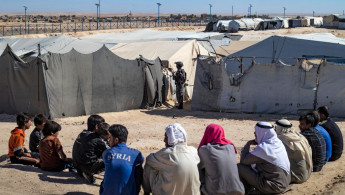UN rights chief slams rape and killing of girls in Syrian camp
UN rights chief Volker Turk on Friday condemned the "heinous killing" of two young Egyptian sisters whose bodies were dumped in sewage at the Al-Hol detention camp in Syria.
He urged the international community and Kurdish-led forces controlling the area to redouble their efforts to protect thousands of women and children still being held in such camps.
"The deaths of these young sisters who had already endured so much misery is deeply distressing. The circumstances behind their deaths, and the manner in which they were killed, beggar belief," Turk said in a statement.
The bodies of the girls, both aged under 15, were found with stab wounds in a sewage ditch at Al-Hol earlier this week. According to reports received by the UN Human Rights Office, the girls had been raped a few days earlier.
A group of radicalised women in the camp then reportedly harassed the girls and their mother due to the stigma associated with being subjected to sexual violence, the office said.
The overcrowded camp in northeast Syria is home to more than 50,000 people, including relatives of suspected jihadists, as well as displaced Syrians and Iraqi refugees. More than half of those inside are thought to be children.
It is the largest camp for displaced people who fled after Kurdish forces, backed by a US-led coalition, dislodged Islamic State group fighters from the last scraps of their Syrian territory in 2019.
Administered by semi-autonomous Kurdish forces, Al-Hol is known for rampant violence.
The UN Human Rights Office has verified the killing of 42 people at Al-Hol this year, including a girl, a boy, four women and 10 men from Iraq, and 18 women and six men from Syria.
"These two girls were trapped in the desperate circumstances of this camp through no fault of their own," said Turk.
"Every child has the right to grow up in an environment protective of their dignity and best interests, without exposure to pain, suffering and violence," he added.
Kurdish authorities have repeatedly called on foreign countries to repatriate their citizens from Syria's crowded camps.
But most have done so only sporadically, fearing security threats and a domestic political backlash.
"This most recent incident must serve as a wake-up call to the international community to immediately repatriate the thousands of women and children -- some of whom have been detained for years -- from these camps back to their home countries," Turk said.





 Follow the Middle East's top stories in English at The New Arab on Google News
Follow the Middle East's top stories in English at The New Arab on Google News
![Both Hamas and the Palestinian Authority welcomed the ICC arrest warrants [Getty]](/sites/default/files/styles/image_330x185/public/2024-11/GettyImages-2178351173.jpg?h=199d8c1f&itok=TV858iVg)

